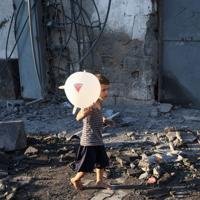GAZA CITY

Four leading news organizations on July 24 said that their journalists in Gaza are facing the threat of starvation, as the number of hunger-related deaths has increased to 113 in the war-torn Palestinian territory.
“We are desperately concerned for our journalists in Gaza, who are increasingly unable to feed themselves and their families,” said a joint statement by The Associated Press, Agence France-Presse, Reuters and the BBC.
“For many months, these independent journalists have been the world’s eyes and ears on the ground in Gaza. They are now facing the same dire circumstances as those they are covering.”
The statement called on Israel to allow journalists in and out of Gaza and allow adequate food supplies into the territory.
With Gaza sealed off, many media groups around the world depend on photo, video and text coverage of the conflict by Palestinian reporters working for international news agencies.
“We have no energy left due to hunger and lack of food,” said Omar al-Qattaa, a 35-year-old AFP photographer shortlisted for a Pulitzer Prize earlier this year.
International criticism is growing over the plight of the more than 2 million Palestinian civilians in Gaza, where more than 100 aid and rights groups have warned that “mass starvation” is spreading.
Hospitals in the besieged strip on July 24 recorded two more deaths due to famine and malnutrition in the past 24 hours, according to the territory’s Health Ministry, bringing the total to at least 113.
The humanitarian situation in Gaza filled hospitals with skeletal infants on the brink of death due to severe malnutrition. Mothers issued desperate pleas for help to prevent their children from slipping away in their arms.
Despite nearly two years of war and repeated warnings of looming famine, Gaza is now facing its worst hunger crisis yet. In just three days this week, public health authorities reported 43 hunger-related deaths, nearly doubling the previous toll of 68.
“I wake up three to four times every night just to check if my daughter is still alive,” said Necah Barbakh, the mother of 11-month-old Sila Barbakh, who suffers from acute malnutrition and has spent seven days in intensive care.
“I pray to God to find her beside me when I open my eyes. Let her cry — so long as she makes a sound, she’s alive. Most of the children in this hospital room have died of hunger. Eighty children have died of starvation — I’m terrified my daughter will be the 81st,” the mother said.
Meanwhile, Israel on July 24 announced that it received Hamas’ latest ceasefire proposal, with an Israeli official calling it “workable.”
Hamas’ response included proposed amendments to clauses on the entry of aid, maps of areas from which the Israeli army should withdraw and guarantees on securing a permanent end to the war, according to a Palestinian source familiar with the ongoing talks in Doha.
The Hamas response came as top U.S. envoy Steve Witkoff was set for travel to Europe, where he is supposed to meet with key leaders from the Middle East to discuss the latest ceasefire proposal and the release of hostages.
